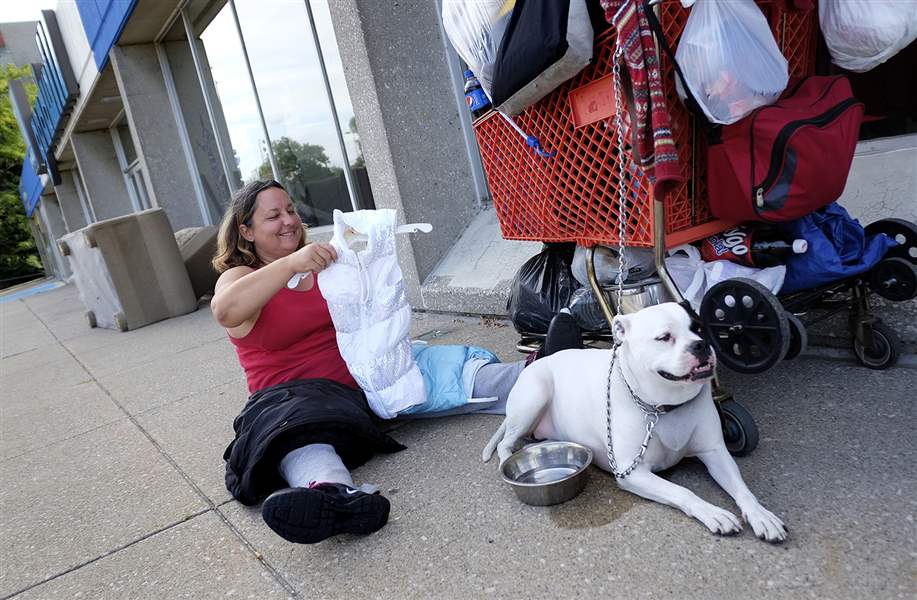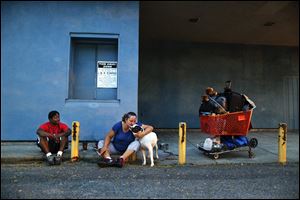
Newly homeless woman struggles to rebuild life — without losing dog
9/18/2016
Diann Wears shops at Goodwill in downtown Toledo for a vest for her dog Cow to wear when the weather turns cold. Having a pet complicates getting services.
THE BLADE/ANDY MORRISON
Buy This Image
First of two parts
Diann Wears doesn’t have much.
The blankets and clothes take up a lot of the space in her shopping cart, some in a large suitcase and others in garbage bags.

Diann Wears and her dog Cow visit with Chaka Gaston, also homeless, at the old Greyhound terminal on Jefferson Avenue downtown. Diann often cannot rest for long in one place because passers-by complain to police, who tell her to leave.
She has a few toiletries and medications, some bottles of water and snacks, a bent kitchen pot, a large blue tarp, two dog dishes, and a bin full of dog food.
And then there’s Cow, a 6½-year-old white boxer mix with a large black patch over the left side of her face, a pouty underbite, and a signature one-sided wiggle used to greet those she knows and likes.
“She is my whole world, my rock,” 51-year-old Diann said of her dog. “I don’t know what I’d do without her.”
Diann is living on the streets in downtown Toledo with Cow by her side.
PHOTO GALLERY: Diann Wears and Cow
RELATED CONTENT: Pets rare among Toledo’s homeless
She has never been homeless before.
“It’s totally new to me and totally scary, I’m not gonna lie,” she said. “But Cow and I, we have each other, and she gives me a lot of love and support.”
Diann recently left her ex-boyfriend of five years. She had already endured emotional abuse for several years when things escalated.
She was slapped, shaken, shoved, and choked. She secretly made plans to leave and set a July 11 deadline.
She said she couldn’t rely on family. She has contact with her two adult children very infrequently, so they are unaware of her predicament and Diann doesn’t believe they are capable of helping her anyway. Other family members are addicted to heroin, and she had no friends to speak of at the time.
Diann was on her own.
While making plans to escape, she tried to find an apartment to rent with her limited funds from Social Security and Supplemental Security Income. But she also prepared for having nowhere to go.
“I called a lot of places,” she said. “They either turned me down because of Cow, or because I don’t make enough money.”
There was no way she was leaving Cow behind to suffer whatever fate could have befallen her.
“I don’t know what my ex would have done,” Diann said. “Cow is my first priority. She is everything to me.”
Her deadline arrived. Diann rented a moving truck and loaded up the few basic household items she intended to keep. With Cow in the passenger seat, she drove to a small storage unit to unload before returning the truck.

Frustration is evident as Diann answers questions on the phone during a meeting at Neighborhood Properties.
Then she walked downtown with her dog and some possessions in tow to join Toledo’s homeless population, her only address a newly acquired post office box.
Diann and Cow have been sleeping together under the overhang in the front of the former Greyhound bus station on Jefferson Avenue, the tarp and a few blankets as their meager protection from the elements and unyielding concrete.
No dogs allowed
Homelessness, by its very nature, is a difficult way to live.
“It’s the total fear inherent in having nowhere to go. Life is only questions,” said Ken Leslie, formerly homeless himself and now an advocate in Toledo. “Where can I go? What will I eat? What can I do to get out of this?”
A variety of resources are available, he said, though connecting to them can be problematic.
“There are services, but if you’re feeling like you’re at the bottom of a hole with no way out, you don’t see that clearly,” Mr. Leslie said.
Each individual’s specific circumstances can inhibit their access, such as addiction or lack of transportation. Those with the ability can visit a library, make phone calls, and find other ways to locate resources.
For Diann, her four-legged companion is also her primary barrier to accessing services.
“Having an animal makes it 10 times more difficult,” Mr. Leslie said. “They aren’t allowed in shelters, in libraries, any place you might go to find a job.”
Even simple tasks like attending a free meal, using the bathroom, and going to appointments are more complicated for Diann. Though she doesn’t trust anyone fully, she will try to arrange for someone she knows from the streets to watch her things and Cow. If she can’t, she has to leave the cart outside, tie Cow’s leash to the cart, and cross her fingers.
“I pray they’ll still be there when I get back,” Diann said.
Finding shade to rest in without being told to leave — either because she’s loitering or because of the dog — can also be difficult. She often sits on the grass at St. Paul United Methodist Church, where the pastor there allows her to stay as long as neither she nor Cow causes any trouble. But sometimes passers-by will call Toledo police, who will then drive by and tell her to leave.
“We don’t bother anybody, but people judge us anyway because we’re homeless,” Diann said. “Or they’re afraid of Cow, even when she’s just lying there.”
The dog does provide a measure of protection on the streets. Diann cuddles with her at night, and Cow has twice alerted her sleeping owner to suspicious individuals in the dark.
“Any time she moves, I wake up,” Diann said.
Cow once deterred a man who appeared to have been watching Diann from across the street simply by sitting in front of her owner and staring at him. On a different night, the dog growled and barked at a woman Diann said was sneaking up to them in an odd manner.
“She’s a pretty good judge of character,” Diann said of Cow. “If she doesn’t like you, there’s a reason.”
Difficult choices
Finding housing is Diann’s biggest continuing struggle. Because she cannot bear to lose Cow, she has been unable to stay in local homeless shelters.
Renee Palacios, executive director of the Family House shelter in Toledo, said very few, if any, shelters in the United States allow pets.
“I’ve never heard of a shelter that accepts people and their pets,” she said. “It’s a common question we get before folks come to the shelter.”
While shelters must permit certain support animals in accordance with the federal Americans with Disabilities Act, Ms. Palacios said the risks are too high and the complications too numerous to allow pets.
“Shelter living can be chaotic,” she said. “We have 115 people in our house, 60 kids. We can’t afford the liability to us as an organization, and it’s for the safety of everyone.”
Ms. Palacios said placing an animal in an unknown, stressful, and ever-changing environment could be a disaster for even the most well-behaved pet. Shelters can’t risk people being injured by animals, and there’s always the possibility someone is allergic. Shelters are often already tight on space, she said, nor can anyone guarantee animals from different families will get along.
“We have a lot of people we work hard to keep together,” Ms. Palacios said. “Sometimes the animal is the last thing the family has to say good-bye to when they enter a shelter.”
The Lucas County Canine Care & Control regularly takes in dogs surrendered by their owners for a wide variety of reasons. While specific numbers are difficult to calculate because of the various ways the information is recorded, housing is one of the most common reasons dog owners give for surrendering their pets.
“It happens quite a bit, I would say at least a couple of times a week,” said Jodi Harding, interim director of the county shelter.

Diann Wears shops at Goodwill in downtown Toledo for a vest for her dog Cow to wear when the weather turns cold. Having a pet complicates getting services.
The circumstances vary, but many owners are moving to places that don’t allow dogs or that have restrictions on breed or weight. Some are losing their homes to eviction, foreclosure, or divorce.
“People tried to find pet-friendly housing and were unable to do so,” Ms. Harding said. “We’re usually their last resort after they’ve asked family and friends, or the other rescues are full.”
A handful each year tell shelter staff outright they are becoming homeless.
There are programs across the country specific to victims of domestic violence that will provide temporary housing for animals, typically through local animal shelters or boarding facilities.
“There are a lot of domestic violence victims who won’t leave and come to a shelter because of the animal. A lot of abusers will attack the animal to hurt the victim,” Ms. Palacios said.
The YWCA in downtown Toledo has a safe-haven program for pets of women fleeing domestic violence. Diann went there Sept. 1, leaving Cow tied to her cart on the sidewalk out front.
The dog does not like to be separated from her human and proceeded to pace anxiously, trying to look into the building for Diann. She soon began a long series of shrill barks, quieting for brief intervals, until Diann emerged. She did not qualify for the organization’s emergency shelter.
“They don’t think I’m in danger from my ex,” Diann said. “They asked if he was looking for me, but I don’t know. I’ve been living on the streets downtown and I haven’t run into him, but I don’t know. And the shelter is full.”
Instead, she filled out an application for one of the organization’s apartments, adding her name — and Cow’s — to a waiting list.
Contact Alexandra Mester: amester@theblade.com, 419-724-6066, or on Twitter @AlexMesterBlade.